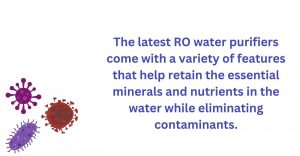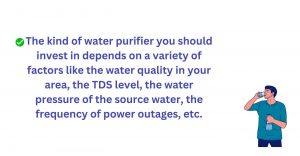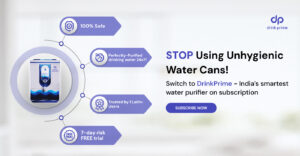In an age of widespread environmental pollution, water purifiers have become an indispensable part of modern living. Getting access to safe drinking water goes beyond the need to protect yourself from waterborne diseases. Contaminants like arsenic, lead, and other heavy metals are equally if not more dangerous in the long run, slowly poisoning your system through the water that you consume.
There are a plethora of water purifiers available today, each touted to be better than the next. The Ro vs UV vs UF has been a long-standing debate. Each of them uses a different technology to purify water and contributes in their own specific ways to make water safe for consumption. Here we briefly discuss these systems and do a comparative analysis to help you choose the purifier which is right for you.
RO purification
RO water purification system is widely considered as the best form of water purification. It is one of the most popular systems available today.
Advantages of RO Purification:
- It employs reverse osmosis technology. In this method, contaminants are removed from dirty water when pressure forces it through a semipermeable membrane. Applied pressure overcomes the osmotic pressure to push the water from the heavily concentrated side with more contaminants to the less concentrated side. The semipermeable membrane prevents the contaminants from passing through leaving you with pure water.
- The semipermeable membrane is provided with pores that block the contaminants but allow clean water to pass through.
- RO filters out dissolved salts along with harmful pathogens, delved solids, heavy metals, and toxins.
- It is useful in areas where source water has a high amount of TDS. It successfully converts hard water to soft water and gives you odorless and sweet-tasting water.
- The latest RO models come with a variety of features that help retain the essential minerals and nutrients in the water while eliminating contaminants, while also ensuring minimal water wastage.

UV purification
UV water purification systems make use of ultraviolet rays from the sun to get rid of contaminants.
Advantages of UV Purification:
- Water contains a host of pathogens like bacteria, viruses, and other molecular organisms. This water, if consumed, leads to deadly waterborne diseases which can prove to be fatal.
- In the UV purification method, water is forced through a tube where it is exposed to UV rays. UV filters are fitted with UV lamps, which provide ultraviolet light. This radiation kills all the harmful pathogens like bacteria and viruses present in the water.
- Since UV purification makes water relatively safe for consumption it is preferred to UF filtration
- UV purification process does not use any chemicals since it is dependent only on ultraviolet rays and is easy to install and operate.
- Though UV purifiers kill pathogens like bacteria, they are not able to eliminate their debris from the water. The dead pathogens continue to be present in water that you will eventually consume.
- UV filters are unable to eliminate TDS from water like RO purifiers. So, a combination of both of these is deemed ideal for your pure water needs.
- These filters are suited for tap or municipal water which comes with low levels of TDS.
UF purification
UF water purification system is the simplest of the purification models available.
Advantages of UF Purification:
- UF purifiers use a single UF filter. This membrane is semipermeable, and it allows water to pass through it. The larger foreign particles and contaminants are not let through and are eventually drained out of the drainage pipe.
- This sort of purification is best used if the tap water available to you is adequately treated.
- It is not advisable to be used if your source water is heavily contaminated.
- There is usually one type of model that all manufacturers make and so the UF filters come in a very limited set of designs.
- This system does not require electricity to run. It is easy to install and operate. It is cheaper compared to RO and UV water purification systems.
- This system is less effective for ensuring the purity and safety of water than RO and UV systems.
- These systems are suited in areas which have frequent power outages as RO and UV do not work without electricity.
RO vs UV vs UF: A comparison to analyze the best of the three.
| RO | UV | UF | |
| 1 | Eliminates pathogens like bacteria and viruses as well as dissolved salts and metals | It kills pathogens but does not eliminate them | Eliminates bacteria and viruses but not heavy metals |
| 2 | Requires electricity to function | Requires electricity | Does not require electricity |
| 3 | Needs high water pressure and an additional pump to operate | Operates with normal tap water pressure | Operates with normal tap water pressure |
| 4 | Removes up to 90 percent TDS | Does not remove TDS | Does not remove TDS |
| 5 | Contains membrane size of 0.0001 micron | Does not have a membrane | Contains membrane of size 0.01 micron |
| 6 | Removes floating and impurities visible to the naked eye | Does not filter these | Filters suspended and visible impurities. |
Get 7 Days Risk Free Trial
Conclusion

So, in this conundrum of RO vs UV vs UF, and UV us UF, the main thing to keep in mind is the quality of your source water. All three purification systems come with their own sets of pros and cons. While RO and UV purifiers work on electricity, UF filers do not need electricity. RO purifiers filter out most of the contaminants and soften water while giving it a sweet taste.
The kind of water purifier you should invest in whether it is RO vs UV vs UF depends on a variety of factors like the water quality in your area, the TDS level, the water pressure of the source water, the frequency of power outages, etc. It is prudent to seek professional help to analyze the source water available to you, and to zero in on a single or a combination of purification systems to always ensure that your family has access to safe and pure drinking water.
FAQs
RO vs UV vs UF Water Purification: Which is Best?
RO, UV, and UF are all effective water purification methods, but the best choice depends on water quality. RO water purifier is ideal for removing dissolved impurities and contaminants, UV is great for killing bacteria and viruses, and UF is best for filtering particles without removing essential minerals. DrinkPrime provides a free and detailed water quality report before and after purifier installation to all its customers.
Which water purifier is preferable to buy?
The best water purifier depends on your water quality. If your water contains dissolved impurities or TDS is high, an RO purifier is ideal. For water with bacteria or viruses, a UV purifier is effective. UF is suitable for water with larger particles but without high chemical contaminants. All DrinkPrime customers receive free, detailed water quality reports before and after purifier installation.
Which water purifier technology is good RO+UV or RO+MF?
RO+UV is ideal for purifying water with high TDS and microbial contamination, as it removes dissolved impurities and kills bacteria/viruses. RO+MF (Microfiltration) is better for water with larger particles but lower microbial contamination. Choose based on your water quality needs. Experience peace of mind with DrinkPrime water purifier. We provide free, detailed water quality reports before and after purifier installation for all our customers.
What’s the maintenance cost of UV RO water filters?
The maintenance cost of UV RO water filters typically includes replacing the RO membrane, UV lamp, and filters every 6-12 months. On average, the yearly maintenance cost can range from ₹1,500 to ₹4,000, depending on the brand and usage. Regular maintenance ensures optimal performance and water quality. With DrinkPrime water purifier, avail lifetime free maintenance.




